Stalking the Typical Poem
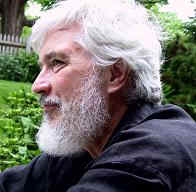
When I tell people I teach and – God help me – even write poetry, they often say, “I wish you could explain modern poetry to me.… continue reading...

When I tell people I teach and – God help me – even write poetry, they often say, “I wish you could explain modern poetry to me.… continue reading...
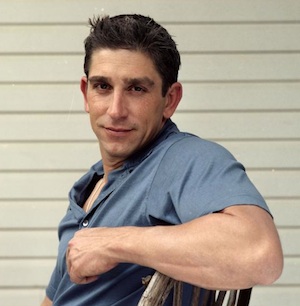
Perhaps the most surprising feature of Richard Blanco’s inaugural poem, “One Today,” is that hardly anyone took notice. In the week after the inauguration, the blogosphere was eerily quiet in regard to the poem.… continue reading...

Richard Blanco’s inaugural poem, “One Today,” sucked. Take the first stanza, which manages to be at once portentous, vaguely imperialistic, and dull:
… continue reading...One sun rose on us today, kindled over our shores,
peeking over the Smokies, greeting the faces
of the Great Lakes, spreading a simple truth
across the Great Plains, then charging across the Rockies.

John F. Kennedy’s request that Robert Frost read at his inauguration had no precedent in United States history, but, in retrospect, appears rather predictable. The 86-year-old writer was already “the embodiment of American poetry,” as Jay Parini puts it in his biography. … continue reading...
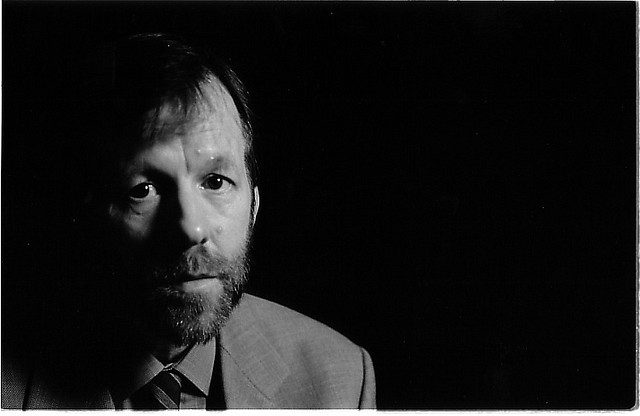
Until recently, Dennis O’Driscoll was among the few living poets I most wanted to meet. He was also the only such poet whose writings I barely knew.… continue reading...
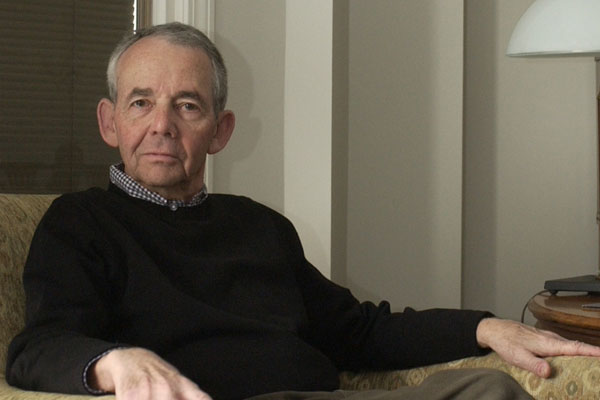
It is nearly twenty-five years since Joseph Epstein published his now famous essay—or as Dana Gioia referred to it, his “mordant 1988 critique”—under the flashy title “Who Killed Poetry?”… continue reading...

 When Solon declared that he learned something new every day (or was it Pericles?—some dead Greek guy, at any rate), he perhaps was not thinking of the utility of the Pratt-Shelby Knot when trying to keep a leather tie proportional enough that the thin end does not emerge at an inconvenient and insistent angle.… continue reading...
When Solon declared that he learned something new every day (or was it Pericles?—some dead Greek guy, at any rate), he perhaps was not thinking of the utility of the Pratt-Shelby Knot when trying to keep a leather tie proportional enough that the thin end does not emerge at an inconvenient and insistent angle.… continue reading...

When I was seventeen years old and barely aware of poetry, with no idea what good poetry might be, or even what if anything might please me, a friend, just back from his English class, rushed breathlessly into my room at boarding school, book in hand, and cried, “Listen to this!”… continue reading...

(Author’s note: No science was involved in the writing of this essay; nor was there any systematic process of interviews. No, this is based on firm anecdotal evidence, told to me by various poets in various stages of sobriety over the course of several years, as well as my own experiences since my first book appeared in 2008.… continue reading...

The present survey is provisional and intended to serve as only the merest introduction to a vast and extraordinarily complex field, one that commands broad, ongoing attention.… continue reading...
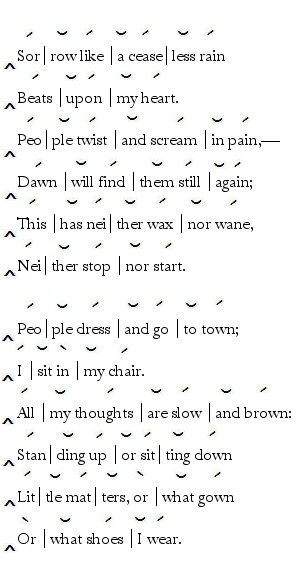
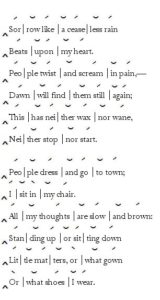 1. Precursors / chronological by country
1. Precursors / chronological by country
A) England
Gascoigne, George. “Certayne Notes of Instruction concerning the making of verse or ryme in English…” In The Posies of George Gascoigne.… continue reading...
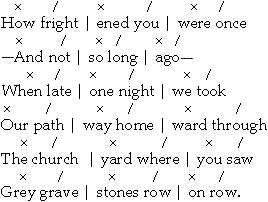
 Few fields have ever been transformed by bibliographical work in the way that literary prosody was changed by the publication of T. V. F. Brogan’s English Versification, 1570 – 1980: A Reference Guide with a Global Appendix (or “EVRG” to its admirers). … continue reading...
Few fields have ever been transformed by bibliographical work in the way that literary prosody was changed by the publication of T. V. F. Brogan’s English Versification, 1570 – 1980: A Reference Guide with a Global Appendix (or “EVRG” to its admirers). … continue reading...
(An Occasional Series: Part One)
Poems reviewed in this article:
In 2008, Horace Engdahl, chair of the Swedish Academy that awards the Noble Prize Committee in Literature, made a fair point when he said that Americans “don’t translate enough,” as one of the reasons why few Americans are on the short list for the prize.… continue reading...
Why Quality Control in Poetry Need Not Be Blindsided by Traditionalism
As Reviewed By: James Rother
For decades now, responsible elements within the critical community have disagreed over how to save American poetry from itself.… continue reading...

Concerning Some Recent Versions of the Metamorphoses by Ovid.
As Reviewed By: James Rother
[Unless otherwise attributed, all translations are the author’s.]
It is remarkable, but hardly strange, that the works of Roman poet Publius Ovidius Naso (better known as Ovid [43 B.C.-17… continue reading...
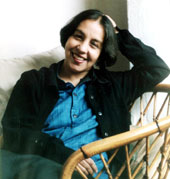
A Close Reading of Two Contemporary Indian Poets
As Reviewed By: Ravi Shankar
The world’s largest secular democracy has been exporting its letters in English for a few literary generations, but in the wake of a few luminaries—Rabindranath Tagore or more recently, Arundhati Roy—many strident, lyrical voices have gone unrecognized (after all, this wave of Indian poets and novelists, for all the hype, is still but a ripple in publishing in terms of sheer numbers).… continue reading...
By: Stephen Schwartz
This is an intensely personal, and elliptical, and non-Aristotelian story.
As a young man I looked for a poem, afraid I could not find it. … continue reading...
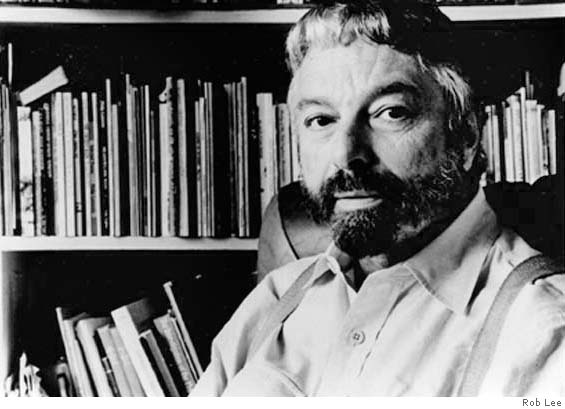
By: Stephen Schwartz
On March 7, the North American poet Philip Lamantia, the only successful English-language versifier in the French surrealist style to appear in this hemisphere, died of heart failure in San Francisco, his native city, at 77.… continue reading...
A Personal Survey of Modern Verse in Ex-Yugoslavia and Albania (Part II)
As Reviewed By: Stephen Schwartz
II.
Modern Bosnian literature
As should be seen throughout the present essay, translation is a difficult art, especially when dealing with poets from a cultural context so different from ours, as North Americans. … continue reading...

A Personal Survey of Modern Verse in Ex-Yugoslavia and Albania
As Reviewed By: Stephen Schwartz
I will begin this highly selective and idiosyncratic discussion of modern Slovene, Croatian, Bosnian, Serbian, and Albanian poetry with an anecdote. … continue reading...

By: Jan Schreiber
The task of the critic is judgment. I hope to unravel the complexities of judgment, as it applies to works of literature, and specifically to poetry.… continue reading...
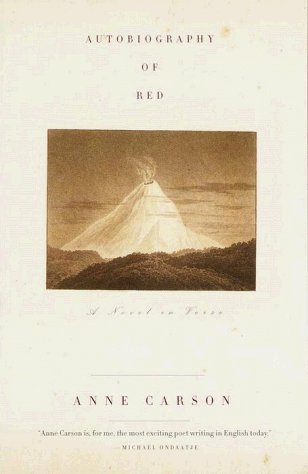
Carson, Anne. Autobiography of Red: a Novel-in-verse. Vintage Books, 1998. 149 pages
Evaristo, Bernardine. The Emperor’s Babe: a Verse Novel of Londinium, 211 A.D.… continue reading...
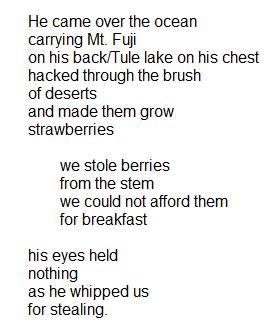
By: Justin Quinn
The main transformations in American literature over the last thirty years have had a strong effect on poetry as well: the consolidation of African-American writers, the emergence of Native-American, Asian-American and Chicano writers, as well as gay writers, to name but a few.… continue reading...
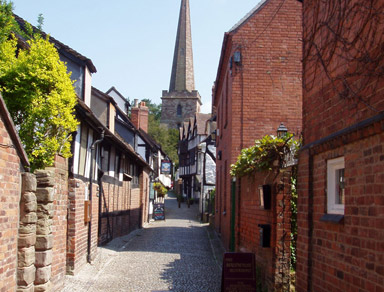
Ledbury Poetry Festival, July 2004
By: Anthony Moore
I wish Edward Thomas (that poet) were here to ponder gulfs in general with me as in the days when he and I tired the sun with talking on the footpaths and stiles of Ledington and Ryton (Robert Frost, “A Romantic Chasm”)
Those days, at the start of World War I, were among the eleven convivial months when Frost lived near Dymock, in England’s rural Gloucestershire.… continue reading...
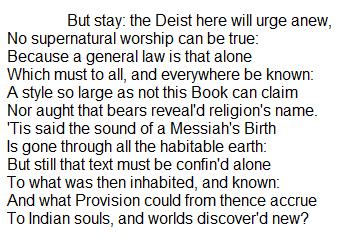
By: Paul Lake
In 1935 in his essay “Religion and Literature,” T. S. Eliot described his era as one in which readers had “never heard the Christian faith spoken of as anything but an anachronism.” … continue reading...
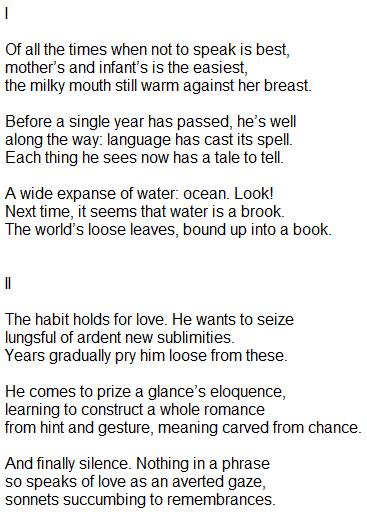
By: Paul Lake
Despite nearly a century’s advances in science, technology, linguistics, and our understanding of human development and cognition, Freud’s Oedipal myth provides the intellectual cornerstone for postmodern literary analysis as well as the chief impetus for avant-garde experimentation in the arts.… continue reading...
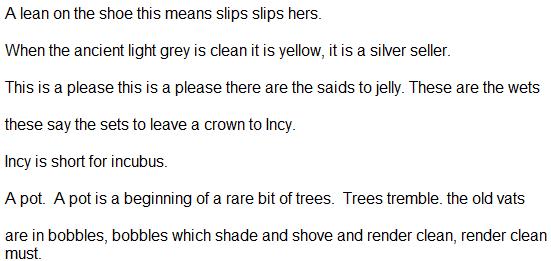
By: Paul Lake
Increasingly over the past few decades, as postmodern critical theories have percolated from the academy down to the general culture, the prestige of literature has declined.… continue reading...

By Paul Lake
At present, the term “free verse” is used to describe a multitude of quite different and even contradictory strategies, several of which may be employed in the same poem.… continue reading...

by Paul Lake
In one of his most memorable pronouncements, written in 1917 at a time when he was championing free verse, Ezra Pound made a classic statement about the shape of poetry:
I think there is a ‘fluid’ as well as a ‘solid’ content, that some poems may have form as a tree has form, some as water poured into a vase.… continue reading...

I have two of Philip Larkin’s poems by heart—“Sad Steps” and “Aubade”—though I admire many more, and it was while reciting the former poem silently to myself during a particularly boring meeting that I noticed a number of things for the first time, most of them related in one way or another to the poet’s use of adjectives:
… continue reading...Groping back to bed after a piss
I part thick curtains and am startled by
The rapid clouds, the moon’s cleanliness.
Word Comix by Charlie Smith. Norton, 2009.
The History of Forgetting by Lawrence Raab. Penguin, 2009.
Blind Rain by Bruce Bond. Louisiana State University Press, 2008.… continue reading...
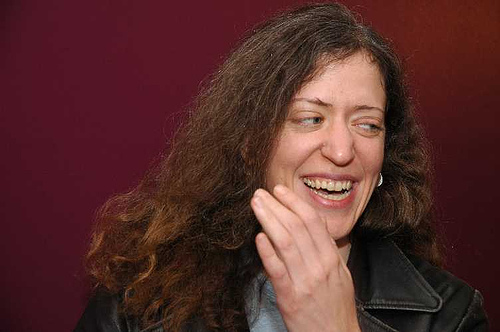
For those familiar with Philip Larkin’s work, the title of this short essay will seem to offer a juxtaposition so improbable as to be laugh-out-loud funny-rather like that old joke staple, the tiny book titled German Humor, or the admittedly unlikely prospect of a panel at a New Formalist conference on “The Achievement of the L-A-N-G-U-A-G-E Poets.”… continue reading...
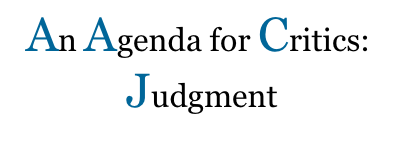
As Reviewed By: Jan Schreiber
The task of the critic is judgment. I hope to unravel the complexities of judgment, as it applies to works of literature, and specifically to poetry.… continue reading...
W. H. Auden’s engagement with the poetry of Byron is perhaps not the most significant of his various literary relationships; probably not as important as that with W.B.… continue reading...
On British and American Poetry
What is the difference between British and American poetry—especially contemporary poetry—and why are they different? Because the two poetries are written in the same language, it seems to make more sense to ask this question of them than to ask, for example, what the differences between Italian and Spanish poetry are, or to what degree Polish poetry differs from Russian poetry.… continue reading...
II.
Unnamed ghosts trouble Baxter as much as those he addresses specifically; when local and personal history intermingle in the Jerusalem Sonnets, crises of faith tend to arise, as in the twenty-fifth sonnet:
… continue reading...The brown river, te taniwha, flows on .
On Frank Sargeson’s wall, up above the fireplace, there used to be (perhaps there still is) a wooden cross . . . . One day I found among cards and pictures on the shelf above the fireplace a photograph of the young Baxter in his alcoholic raincoat.… continue reading...
Letters of Ted Hughes, selected and edited by Christopher Reid. Farrar, Straus and Giroux, New York, 2008, 758 pp., $45. Published originally, Faber & Faber, UK, 2007, £30.… continue reading...
III
… continue reading...O early ripe! To thy abundant store
What could advancing age have added more?
It might (what nature never gives the young)
Have taught the numbers of thy native tongue.
II
… continue reading...
Marble staircases climb the hills where derelict estates
glimmer in the river-brightened dusk . . .
And some are merely left to rot where now
broken stone lions guard a roofless colonnade .
… continue reading...While arguing amid the colonnades,
Tired in the noon-day by the badly taught,
Or resting, dubious, in the laurel shades
I have impinged upon a firmer thought.
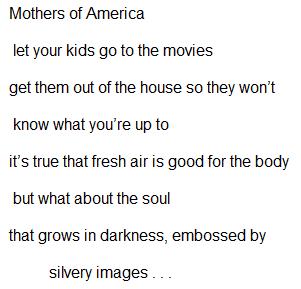
A Survey of Verse Scribblers on the Silver Screen
As Reviewed By: Kathleen Rooney
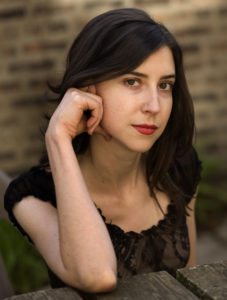 If you hit the trivia section of the Internet Movie Data Base entry for Steven Spielberg’s 2002 high-tech adaptation of Philip K.… continue reading...
If you hit the trivia section of the Internet Movie Data Base entry for Steven Spielberg’s 2002 high-tech adaptation of Philip K.… continue reading...
Travel Writing and the Canon
Like many odd literary creatures from the British 1930’s, W.H. Auden and Louis MacNeice’s Letters from Iceland (1936) is referred to more frequently as a representative period piece than as an achieved work of art.… continue reading...
I
Early in 1941, as British forces were pushing Italian tanks back into Libya and spoiling Mussolini’s dreams of becoming a full member to the Axis powers, Ezra Pound was hard at work in Rapallo, pushing dreams of his own.… continue reading...
In the world of American poetry, getting a call from Dana Gioia is like getting blessed by the Pope. This spring, I received that benediction when he invited me to West Chester, Pennsylvania, for the 9th Annual Conference on Exploring Form & Narrative in Poetry. … continue reading...